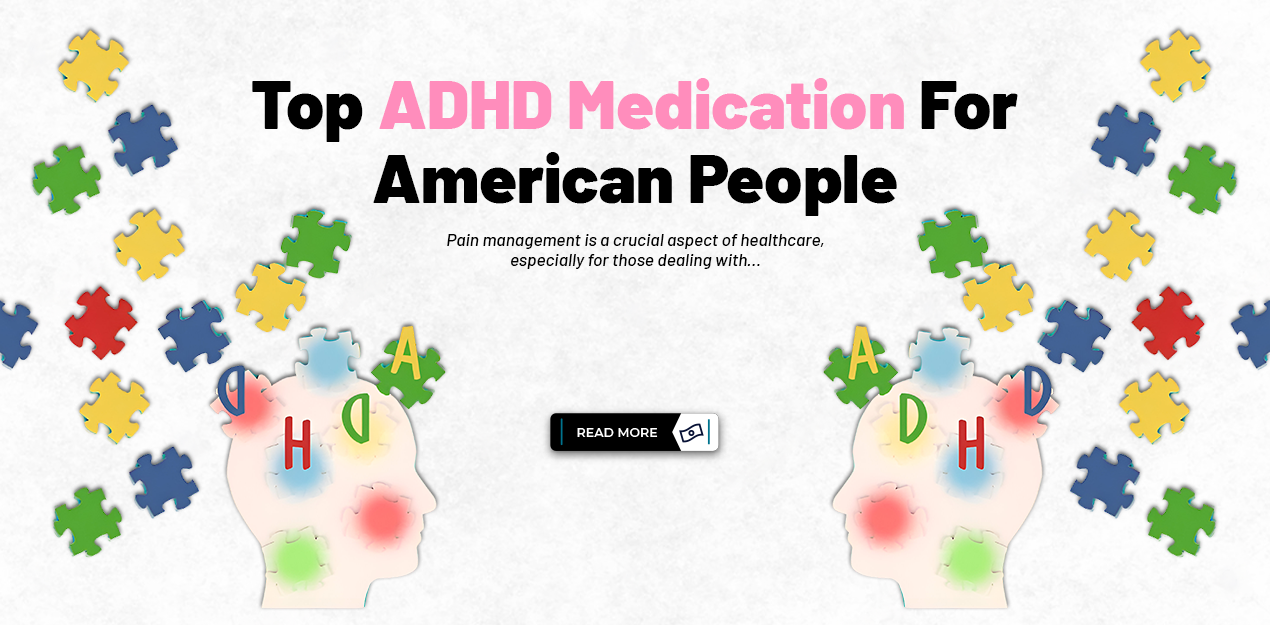Top ADHD Medication for American People
Top ADHD Medication for American People
Attention Deficit Hyperactivity Disorder (ADHD Medication) is a common neurodevelopmental disorder that affects both children and adults. In the United States, millions of people live with ADHD, managing symptoms such as inattention, hyperactivity, and impulsivity. For many, ADHD medication is an essential part of treatment, helping to enhance focus and control behavior. Here’s a look at some of the top ADHD medications frequently prescribed to Americans.
1. Adderall (Amphetamine/Dextroamphetamine)
Adderall is one of the most well-known ADHD medications in the U.S. It is a combination of two stimulant drugs, amphetamine and dextroamphetamine. These chemicals increase levels of certain neurotransmitters in the brain, particularly dopamine and norepinephrine, which helps improve attention, concentration, and impulse control.
- Form: Immediate-release and extended-release (Adderall XR)
- Best For: Short-term symptom relief (IR) or all-day coverage (XR)
- Side Effects: Insomnia, loss of appetite, increased heart rate, anxiety
2. Vyvanse (Lisdexamfetamine)
Vyvanse is a prodrug, meaning it needs to be metabolized in the body to become active. It is commonly prescribed for both ADHD and binge eating disorder. Vyvanse provides long-lasting symptom control, making it ideal for patients who need day-long coverage with less risk of misuse.
- Form: Capsule, chewable tablet
- Best For: Adults and children seeking consistent daily control
- Side Effects: Dry mouth, insomnia, decreased appetite, jitteriness
3. Ritalin (Methylphenidate)
Ritalin is another stimulant medication frequently prescribed for ADHD medication. Like Adderall, it increases dopamine and norepinephrine levels in the brain. Ritalin has been used for decades and is available in multiple forms, including immediate-release and extended-release.
- Form: Tablet (IR and ER), capsule (Ritalin LA)
- Best For: Short-term control (IR) or steady symptom management (ER/LA)
- Side Effects: Nervousness, headaches, nausea, increased blood pressure
4. Concerta (Methylphenidate ER)
Concerta is a long-acting form of methylphenidate that provides smooth, extended symptom control over 12 hours. It is ideal for children and adults who need all-day management of ADHD medication symptoms without needing multiple doses throughout the day.
- Form: Extended-release tablet
- Best For: Patients looking for long-term, consistent ADHD relief
- Side Effects: Decreased appetite, difficulty sleeping, dizziness
5. Focalin (Dexmethylphenidate)
Focalin contains only the active part of methylphenidate, making it more potent at lower doses. It comes in both immediate-release and extended-release forms and is designed to provide smoother, more focused symptom control.
- Form: Tablet (IR), capsule (ER)
- Best For: Patients needing potent ADHD relief with fewer side effects
- Side Effects: Abdominal pain, loss of appetite, anxiety, restlessness
6. Strattera (Atomoxetine)
Strattera is a non-stimulant medication, making it a good option for patients who cannot tolerate or do not respond well to stimulants. It works by selectively increasing norepinephrine levels in the brain. Strattera is not habit-forming, which makes it a favorable option for long-term treatment.
- Form: Capsule
- Best For: Individuals with stimulant sensitivity or co-occurring anxiety
- Side Effects: Drowsiness, mood swings, nausea, decreased appetite
7. Intuniv (Guanfacine ER)
Intuniv is an extended-release non-stimulant medication often prescribed to children with ADHD. It is commonly used as an adjunct to stimulant medications or for patients who have not found success with stimulants alone. Intuniv works by affecting receptors in the brain that control attention and impulse.
- Form: Extended-release tablet
- Best For: Children or teens who need added symptom control or prefer non-stimulants
- Side Effects: Fatigue, dry mouth, irritability, weight gain
8. Kapvay (Clonidine ER)
Kapvay is another non-stimulant medication that can be used alone or in combination with stimulants. It helps reduce hyperactivity and impulsivity by affecting the central nervous system. Kapvay is especially helpful for patients with ADHD who also have trouble sleeping.
- Form: Extended-release tablet
- Best For: ADHD patients with insomnia or those seeking a non-stimulant option
- Side Effects: Sleepiness, irritability, low blood pressure, dizziness
Conclusion
ADHD treatment is highly individualized, and the choice of medication depends on factors such as age, symptom severity, and personal response to drugs. Stimulants like Adderall and Vyvanse remain the most popular options in the U.S., but non-stimulants like Strattera and Intuniv provide effective alternatives for those who need them. Always consult with a healthcare professional to find the right medication for your needs, and make sure to monitor for any side effects or necessary dosage adjustments.

